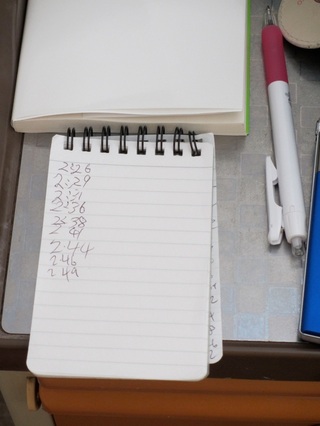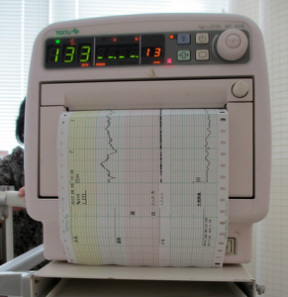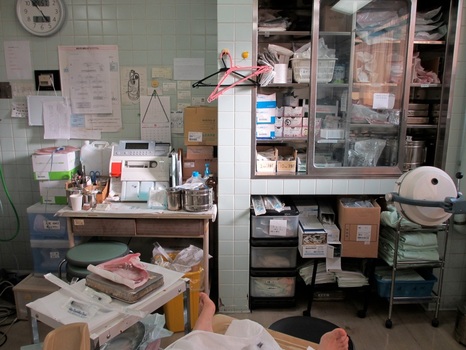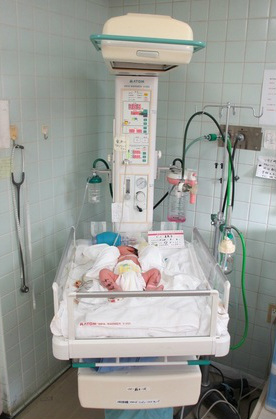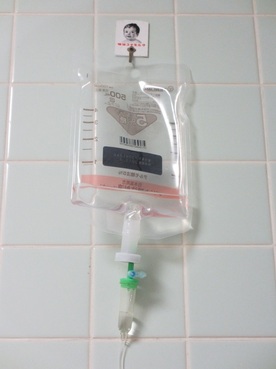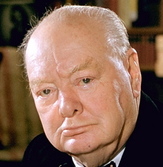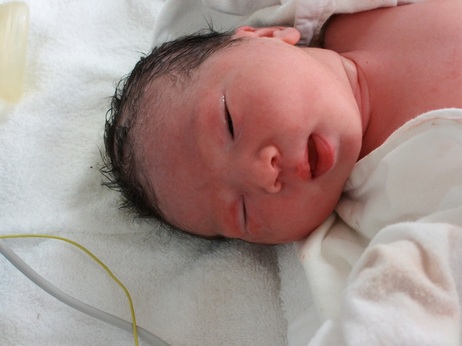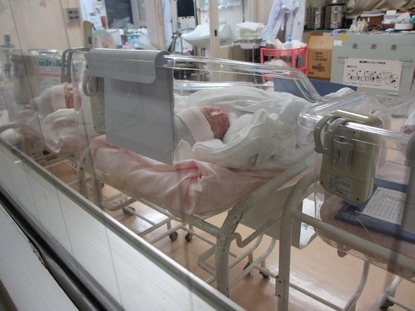I awoke at ten past six to the sound of muzak drifting in from the hotel corridor, and while the weather outside had improved since the previous evening, it was still very much on the moody side.
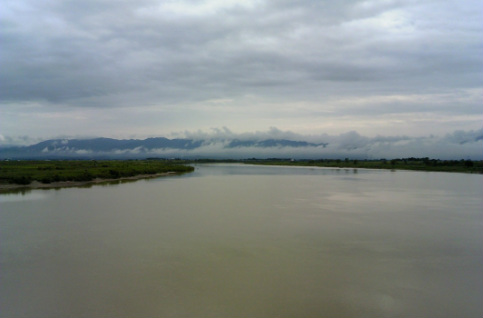
Pretty soon I had left the mountains behind me, and riding through the suburbs of Niigata City was relatively straightforward, as they were full of rice fields and flat as a pancake. The only problem was that after just three days on the road, I had begun to develop saddle sore. Saddle sore is a funny thing (funny peculiar, that is): on my first tour I went for six weeks without the slightest hint of it, but on my second I had to buy an extra-soft, gel-filled seat cover to stave off the symptoms. With less money to spare this time round, I ventured into a chemist’s and asked if they had any cream for…well, you know, for…
‘Do you mean…?’ said the assistant.
‘No, it’s more a kind of…’
‘And does it…?’
‘A little bit, yes. But it’s also…’
‘How about this one. It’s good for…’
‘What if you…?’
‘That too. Although you might want to try this instead. If it’s…’
‘I don’t think it’s going to be…’
‘Well, so long as you’re not…’
‘No, I should think that’ll be fine for…’
I ended up buying the smallest tube of the cheapest cream they had, and the fact that it contained steroids may have helped me through the rest of the trip in more ways than one.
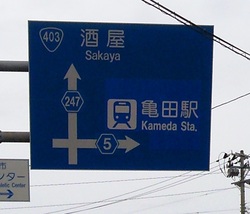
Passing this sign along the way (I don’t know about you, but I quite like the idea of living in a town whose name – Sakaya / 酒屋 – means ‘off-licence’), I reached the ferry terminal just in time to buy a ticket for the 12.40 departure to Sado Island.
‘Your bicycle goes free,’ said the cashier, ‘so that’ll be 2320 yen, please.’
This was a pleasant surprise, as the ferry company’s website had listed the fare for one-adult-plus-two-wheeled-non-motorised-vehicle as more like 3400. I handed the cashier a 5000-yen note, and in return got my ticket, a receipt and the change: a 1000-yen note and some coins. With just a few minutes before the ferry was due to leave, I rushed outside, unlocked my bicycle and wheeled it on board, and it wasn’t until I was up on deck that I realised I had been short changed.
Part of the problem with learning a foreign language is that you can never be one hundred per cent sure of what the person you’re talking to has said, and partly because of this, partly because of my congenital mathematical ineptitude, partly because I was in a hurry and partly because the price was cheaper than I had been expecting, I didn’t notice the discrepancy straight away. (Having said that, would I have noticed if I was in the UK and we had both been speaking English? Possibly not.)
I went up to the information desk to explain what had happened, and about twenty minutes later my name was called out over the PA system.
‘We’ve checked with the ticket office,’ said the man behind the desk, who a few minutes earlier had been banging a kind of dinner gong to signal the ferry’s departure, ‘and it would appear that you were correct. One of the tills had a surplus of 1400 yen. Please accept our apologies, and here is your money.’
While I was almost certain the cashier had short-changed me by 1000-yen, I was almost equally certain that it hadn’t been by any more than that. But seeing those four extra 100-yen coins in my hand, I decided to keep quiet: after all, I was poor, I was hungry and I had just noticed from the menu in the cafeteria that a bowl of soba cost exactly 400 yen, so that was what I had for lunch, with a comparatively clear conscience.
Apart from this unexpected cash bonus, easily the most diverting aspect of the two-and-a-half-hour trip to Sado was the large flock of seagulls that followed us out of the harbour. No doubt through years of experience, what these canny – and hungry – birds have realised is that if they fly alongside the ferry, excited tourists will feed them with as many reconstituted potato flour snack products as they can eat. Some people hold their crisps aloft and wait for a seagull to swoop in and grab them, but most simply throw them overboard, where they will be expertly intercepted and gulped down in mid-air.
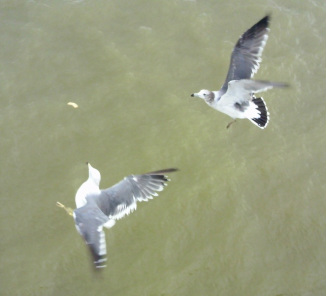
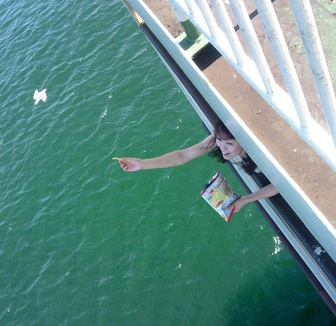
As I was brushing my teeth in the gents after lunch, a bespectacled man in a check shirt came up to me and said, ‘Strasvutchié.’
‘Mmgmhm?’ I replied with a mouthful of toothpaste.
‘Strasvutchié.’
‘Ngmhmgm!’
I assumed he was saying hello in an impenetrably broad Niigata accent, and said hello back as best I could without dribbling onto my t-shirt. After a couple more attempts at communicating, he bowed apologetically and left, but I caught up with him in the lobby a couple of minutes later.
‘Sorry about that,’ I said. ‘I was trying to say hello but you probably couldn’t understand me.’
‘That’s OK. Where are you from? America?’
‘England.’
‘Ah. There are quite a few Russians in Niigata, so I was saying hello in Russian: strasvutchié.’ I learnt the merest smattering of Russian when I was at school, but not enough to recall it in such an unexpected context. As it turned out, though, N-san’s English was even better than his Russian.
‘I studied it in New Zealand,’ he said.
‘Is that where you live now?’
‘No, I live in Tokyo. How about you?’
‘Ibaraki.’
‘I went to university in Chiba.’ Part-suburban and part-countryside, Chiba is sandwiched between Ibaraki and Tokyo. ‘Ibaraki is a bit like Chiba, isn’t it?’
‘How do you mean?’
‘Quiet.’
‘Ha ha! Yes, “quiet” is a pretty good way of describing it.’ I couldn’t help thinking of Ford Prefect’s entry for the planet Earth in The Hitch-hiker’s Guide To The Galaxy: ‘mostly harmless’.
‘Do you know Constable?’ continued N-san.
‘The painter, you mean?’
‘Yes. I really like Constable.’
‘Me too. His paintings are very English.’
‘I went to the National Gallery once. I also went to Newton’s birthplace – I studied physics, you see, so I had always wanted to go there.’
‘Ah, the apple!’
‘Yes, the apple. Do you know anything about Sado?’
‘Not much.’
‘Have you heard of Charles Jenkins?’
‘No.’
‘It’s ironic, because he’s probably the most famous person on the island, and he’s American.’
Jenkins (thank you, Wikipedia!) defected to North Korea during the Korean war, and ended up staying there – not necessarily of his own volition – for the best part of forty years. Over the past few decades, the North Korean government has intermittently kidnapped Japanese citizens, supposedly for intelligence purposes, and Jenkin’s wife Hitomi was one of these unfortunate few. The two met and married in North Korea, and during a period in which relations between the countries had cooled off ever so slightly, were allowed to visit Japan with their children. Perhaps unsurprisingly, they never went back.
‘How about the toki?’ N-san pointed to a photograph of a toki on the lobby wall. ‘It’s called the crested ibis, although the Latin name is Nippon Nipponia. “Japan Japan” – you can’t get much more Japanese than that! They disappeared from Japan, though, so now they’re having to re-import them from China. What are you going to do on Sado, anyway?’
‘Well, I wanted to cycle all the way around the coast, but now I’ve seen a proper map, it looks bigger than I thought.’
‘Yes, it’s probably 2 or 300 kilometres.’
‘Really? I’d rather have some time off from riding the bike, I think. How about you?’
‘My sister lives here with her son, so I’m staying with them for a couple of days. They live in Sawata, which is not very beautiful. In fact, it’s probably the least interesting town on the island.’
Naturally, Sawata is exactly where I headed once the ferry had arrived at Ryotsu port, as it was less than an hour’s ride away and had a campsite, whose caretaker really did have an impenetrably broad Niigata accent.
‘Did you slvg oind qpidknc odiioa?’ he said when I poked my head around the door of his office.
‘Excuse me?’
‘Did you come for the xlirnhce?’
‘What was that?’
‘Did you come for the festival?’
‘What festival is that?’
‘The Zoqedk Festival.’
‘The what?’
‘The Earth Festival.’
‘I didn’t realise there was one.’
‘Well, you’re too late anyway. You’ve missed it.’
‘Oh.’
‘How pqigld oidowg lneq?’
‘Pardon?’
‘How long are you oshgecm?’
‘Er…’
‘How long are you staying?’
‘One night. Maybe two. I haven’t decided yet.’
‘You have to decide now.’
‘Do I?’
‘Yes. I won’t be here tomorrow. It’ll be a different person, so you have to decide now.’
‘Right. OK. Er, one night then.’
‘That’ll be qpondg hdii dnclk.’
‘Excuse me?’
And so on and so forth.
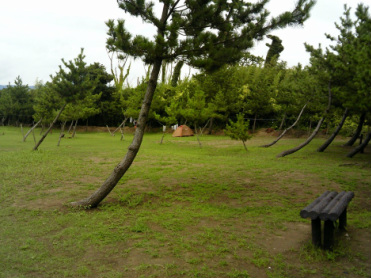
Despite the rather terse service, the site was in a lovely spot – in a grove of pine trees and just across the road from a sandy beach – and after visiting the local onsen for a bath and and the local convenience store for dinner, I was lulled to sleep by the sound of chirping crickets.
